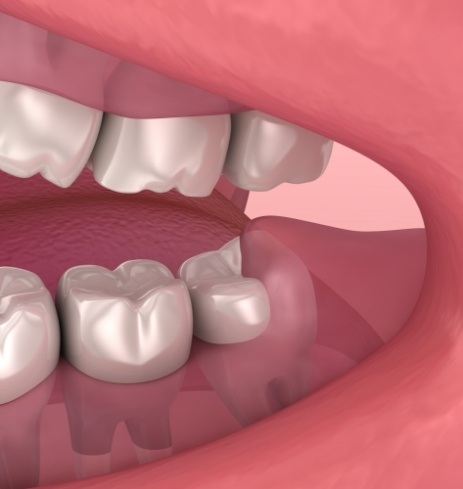Wisdom Tooth Extractions Dumfries
When It’s Time for Wisdom Teeth to Go
Dr. Shinwari has years of training and experience when it comes to wisdom teeth removal. When you or your child are referred to us for painful or impacted wisdom teeth, you can count on us to remove the problematic teeth as quickly and gently as possible in order to stop the pain and protect the rest of the smile. If you call Oral & Facial Surgery Center of Virginia today, you can learn more about how our specialty dental office handles wisdom tooth extractions for our Dumfries patients.
Why Choose Oral & Facial Surgery Center of Virginia for Wisdom Tooth Extractions?
- Variety of Sedation Options Available
- Patients Booked as Soon as Possible
- Experienced Surgeon Using the Latest Technology
Indications for Wisdom Tooth Removal
Many people don’t realize that it’s actually possible to keep wisdom teeth as long as they’re not causing any problems. That said, you most likely need a wisdom tooth extraction if a partially or fully impacted wisdom tooth is accompanied by:
- Significant chronic or recurring pain
- Damage to the nearby teeth
- An increased risk of gum disease and tooth decay (since the area is harder to clean)
- Tumors and/or cysts forming around the wisdom tooth
Impacted Wisdom Teeth

When we say that a wisdom tooth is “impacted”, it means that it has failed to completely break through the gums or may not have erupted at all. This usually occurs due to a lack of space in the mouth; the wisdom teeth come in much later than the other teeth, and consequently there’s just not enough room for them to erupt properly. If you have impacted wisdom teeth, you should have them removed as quickly as possible before they cause serious harm to your other teeth or your jaw.
Wisdom Teeth Removal
Removing wisdom teeth usually requires surgery, so we’ll numb your mouth and administer sedation as needed to keep you comfortable during your procedure. We’ll make an incision in the gums and remove the bone until we have access to the root of the tooth. If we need to, we can divide the tooth into sections that can be removed one at a time. After removing the tooth, we can clean the extraction site and stitch the wound closed.
After Extraction of Wisdom Teeth

Wisdom teeth recovery can take up to two weeks, although you’ll usually be able to return to your normal daily activities much sooner than that, typically within two or three days. While you’re recovering, use a cold cloth to reduce any swelling and take any prescribed medication to deal with discomfort. Eat soft or liquid foods for at least a few days and use the other side of your mouth to chew. After the first 24 hours, you can rinse your mouth with an antiseptic mouthwash to protect the surgical site from harmful bacteria.
Wisdom Tooth Extractions FAQs

If you have upcoming wisdom tooth extractions, you might have some questions and concerns about the process. Our team is happy to assist you in answering these questions and walking you through everything that you can expect. We’ve gathered some of the most frequently asked questions about wisdom tooth extractions and their answers so that you can feel informed and confident about your upcoming surgery. Of course, if you have any additional questions, you’re welcome to give us a call; we’re happy to help!
Why Do We Have Wisdom Teeth?
Your wisdom teeth might seem like nothing but an annoyance, but they served a very important purpose for your ancestors. Early humans ate a very coarse diet that consisted of several raw foods like meats, berries, roots, nuts, and other earthy items. But since they didn’t cook or slice up their food like we do today, their jaws needed to be broader and stronger—which necessitated the need for a third set of molars. However, modern food is softer and easier to eat due to how it’s prepared, meaning that wisdom teeth aren’t a necessity anymore and human jawbones have gradually evolved to typically not have room for them.
How Long Does Wisdom Tooth Surgery Take?
On average, it takes about 15 to 20 minutes to extract one wisdom tooth, meaning that removing all four can take up to about 90 minutes. However, the time it takes can also vary depending on the tooth’s location, position, whether it’s impacted, etc. Our dental team will be able to give you an accurate estimate of how long your procedure should take. In any case, regardless of how long your procedure actually takes, it will feel as if barely any time has passed at all since you’ll be sedated!
Does Wisdom Tooth Removal Hurt?
The very first thing we’ll do during your wisdom tooth surgery is sedate you and numb your mouth with a local anesthetic, so pain isn’t something you need to worry about at all! You might feel some slight pressure as the teeth are gently rocked back and forth in their sockets, but it shouldn’t be outright painful. Some soreness or general discomfort is common following the procedure, but as long as you follow your aftercare guidelines, you’ll feel back to normal within about a week or so.
What Can I Do to Prepare for Wisdom Tooth Extractions?
You’re welcome to ask us any questions you have prior to your wisdom tooth extraction, no matter how minor they may seem! However, we’ll supply you with some specific guidance on what you need to do before your surgery. Some helpful tips include:
- Arrange to have somebody drive you to and from the appointment, as you won’t be fit to drive after receiving sedation or anesthesia. It’s also wise to have them keep an eye on you for a few hours following the procedure.
- Shinwari will need to know what prescribed and over-the-counter medications you take, if any, to avoid unwanted interactions.
- If you’re receiving general anesthesia, avoid eating or drinking after midnight the night before your procedure. Also, refrain from smoking for at least 12 hours before the procedure.
- Consider wearing loose, comfortable clothing to your appointment. If you’re getting IV sedation, wear a shirt that has short sleeves, or sleeves that are easy to roll up.
- Stock up on plenty of soft foods and liquids; you’re going to need them for the next few days!
Does Everyone Have Wisdom Teeth?
Are you wondering how many wisdom teeth most people have? Typically, there are four: one for each quadrant of the mouth. However, according to a study published in 2015, approximately 37% of the population is missing one or more of these third molars.
The reason for this isn’t entirely known, but genetics seems to play a factor. That means if either of your parents has fewer than four wisdom teeth, you’re also more likely to be missing some. Some individuals are even lucky enough that they never grow them at all!
How Can I Address Wisdom Tooth Aches?
There are several ways to mitigate symptoms when your wisdom teeth grow in. For instance, taking over-the-counter medications like Tylenol or ibuprofen can often safely reduce aches and inflammation, and placing an ice pack to the sore side of your face for a few minutes can provide a temporary numbing reprieve. You might even place a numbing gel, like Orajel, directly to your tender tissues.
With that said, the only way to permanently resolve the issue is to extract the troublesome teeth that are hurting.
What Is the Best Age to Get Wisdom Teeth Removed?
Thankfully, there’s no age limit or restriction on when you can have your last molars removed. However, many experts recommend undergoing the procedure as a youth when your jaw is more malleable because it causes less discomfort and tends to heal faster.
As you age, the roots of your teeth grow longer and become more firmly embedded in your jaw, which often leads to a lengthier recovery period than you would have had if your wisdom teeth were removed as a teenager or younger adult.
Should Wisdom Teeth Be Removed If They Don’t Hurt?
It’s easy to understand why sore wisdom teeth should be extracted, but what if yours aren’t currently causing any problems? Do they still need to be pulled?
The answer depends on your unique circumstances, but don’t be surprised if Dr. Shinwari recommends removal anyway. Wisdom teeth are notorious for causing several issues in addition to aches that might require extraction, including:
- Impaction. They frequently grow at odd angles and become trapped in your jawbone, which can cause a cyst or infection to develop.
- They’re known for pushing neighboring teeth out of alignment in their attempt to push through your gumline.
- Dental issues. Wisdom teeth frequently only partially erupt, making them difficult to brush and floss. This increases your vulnerability to cavities, gum disease, and other concerns.
Our team can take X-rays to determine how many wisdom teeth you have and whether they require removal.
Cost of Wisdom Tooth Extraction

When you’re told that you need to have your wisdom teeth removed, your first question might be, “How much will the treatment cost?” While there’s no one answer to that question that will apply to every patient, our team can give you a reliable estimate after they’ve had a chance to examine your mouth and consider your oral health situation as a whole. Below are some of the factors that can affect how much you pay for wisdom tooth removal as well as steps you can take to make the treatment affordable.
Factors That Can Affect the Cost of Wisdom Tooth Extraction
First of all, the number of wisdom teeth being removed matters. Most people have four wisdom teeth, but it’s not unheard of to have three or fewer, and there are cases of patients with five or more. Obviously, the more teeth that need to be removed, the more you can expect the treatment to cost.
The type of extraction can affect the cost as well. Normally, wisdom tooth removal requires surgical extraction, but a simple extraction might be possible if the teeth in question have managed to erupt. Simple extractions tend to cost less than surgical extractions.
Finally, dental sedation might be used to keep you comfortable during wisdom tooth extraction. If it is, it will be factored into the overall price of the procedure.
Does Dental Insurance Cover Wisdom Tooth Extraction?
Most dental insurance plans do indeed provide coverage for wisdom tooth extraction. You can usually expect your policy to pay up to half the cost of the procedure (before taking factors like the deductible and annual maximum into account). That said, not every dental plan is exactly the same; before you begin the process of having your wisdom teeth removed, you should get in touch with your insurance provider and confirm the details of your coverage. If you’re having trouble understanding your plan, please let us know; our team can answer any questions you have.
How to Make Wisdom Tooth Extractions Affordable
Patients who don’t have dental insurance at all might be worried about being able to afford a wisdom tooth extraction. Luckily, even uninsured patients still have options thanks to third-party financing. By applying for a financing plan that lets you pay in installments instead of all at once, you can make the cost of your treatment much easier to handle.
Our practice works with CareCredit and LendingClub, two financing companies that are trusted by oral health experts across the country. Their plans have low-to-no interest, allowing you to pay at a rate that’s comfortable for you. If you’re interested in using financing to pay for a wisdom tooth extraction, reach out to our office today; we’ll be more than happy to go over the process with you and help you take the first steps.

